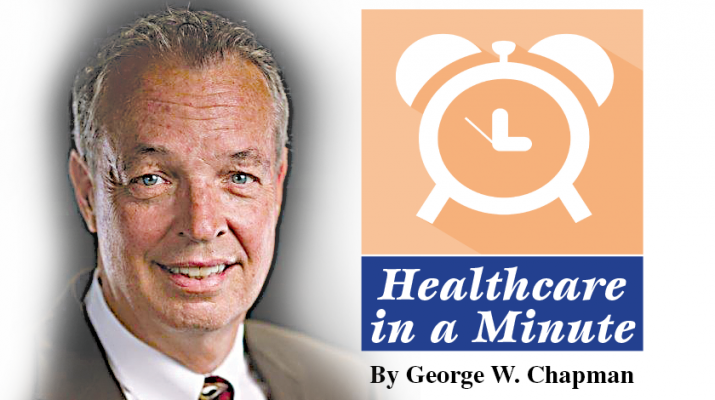By George W. Chapman
 The recent ruling limiting the authority of federal agencies like the EPA, Consumer Protection Agency, Education and the Department of Health and Human Services to promulgate regulations broadly intended to protect consumers will have untold consequences on our healthcare system. The court overturned a 40-year precedent that gave deference to federal agencies over legal challenges to their regulatory authority or decisions based on science. The court has basically deemed itself the expert on everything; the court can now second guess what Congress intended when drafting a law presumably to protect consumers. Basically, this ruling allows every special interest group like hospitals, insurers, equipment and drug manufacturers, to challenge regulations not specified in law. The drug cartel, er industry, is already working hard to reverse the law requiring them to finally negotiate drug prices with Medicare. It was to go into effect in 2026. So CMS (Medicare) and the FDA will have to be far more cautious when drafting regulations. Consumers, providers and healthcare systems can expect more uncertainty and confusion and less stability in our already uncertain, confusing and unstable healthcare system.
The recent ruling limiting the authority of federal agencies like the EPA, Consumer Protection Agency, Education and the Department of Health and Human Services to promulgate regulations broadly intended to protect consumers will have untold consequences on our healthcare system. The court overturned a 40-year precedent that gave deference to federal agencies over legal challenges to their regulatory authority or decisions based on science. The court has basically deemed itself the expert on everything; the court can now second guess what Congress intended when drafting a law presumably to protect consumers. Basically, this ruling allows every special interest group like hospitals, insurers, equipment and drug manufacturers, to challenge regulations not specified in law. The drug cartel, er industry, is already working hard to reverse the law requiring them to finally negotiate drug prices with Medicare. It was to go into effect in 2026. So CMS (Medicare) and the FDA will have to be far more cautious when drafting regulations. Consumers, providers and healthcare systems can expect more uncertainty and confusion and less stability in our already uncertain, confusing and unstable healthcare system.
USA Is No. 11
As of 2022, we rank 11th in the World Index of Healthcare. We were ranked sixth previously. Our decent, but not great, ranking out of 32 advanced countries was bolstered by our high performance in research and innovation and in our biotech industry. That’s the “good” news. Not surprisingly, we are dead last in fiscal sustainability. Our cost of care per capita is nearly twice the average cost of the other 31 countries. Surely, after spending so much, we must rank high on quality. Nope. We rank 19th in quality. Good to know we are getting a good bang for our buck.
Speaking of Financial Sustainability
 A recent poll of 3,300 people older than 50, conducted by the University of Michigan, found that the top three concerns about health were the cost of care overall, the cost of long-term care and the cost of drugs. Also in the top 10 concerns were the cost of insurance, the cost of oral care, financial scams and fraud. Is there an overriding theme here? Considering the recent Supreme Court decision, addressed above, costs could actually get worse if special interest groups like the pharmaceutical manufacturers can challenge cost control regs that are not rooted in law.
A recent poll of 3,300 people older than 50, conducted by the University of Michigan, found that the top three concerns about health were the cost of care overall, the cost of long-term care and the cost of drugs. Also in the top 10 concerns were the cost of insurance, the cost of oral care, financial scams and fraud. Is there an overriding theme here? Considering the recent Supreme Court decision, addressed above, costs could actually get worse if special interest groups like the pharmaceutical manufacturers can challenge cost control regs that are not rooted in law.
OB-GYN Exodus
 States with strict abortion laws that criminalize abortion, case in point Idaho, are experiencing an exodus of this specialty. In the last year, Idaho has lost almost a quarter of its OB-GYNs. The departure of these physicians was felt first and hardest in rural underserved areas. The departure of physicians has impacted hospitals and local businesses. Medical students are declining residencies in states with strict abortion laws. Idaho lawmakers remain unphased. Ironically, the Supreme Court interceded, ruling Idaho must allow abortions in medical emergencies per the Emergency Medical Treatment and Labor Act.
States with strict abortion laws that criminalize abortion, case in point Idaho, are experiencing an exodus of this specialty. In the last year, Idaho has lost almost a quarter of its OB-GYNs. The departure of these physicians was felt first and hardest in rural underserved areas. The departure of physicians has impacted hospitals and local businesses. Medical students are declining residencies in states with strict abortion laws. Idaho lawmakers remain unphased. Ironically, the Supreme Court interceded, ruling Idaho must allow abortions in medical emergencies per the Emergency Medical Treatment and Labor Act.
TV Drug Ads
 Seen enough of them? It wasn’t always this bad. Forty years ago, the FDA allowed drug ads on TV if they were the same boring ads as for physicians. But in 1997, the FDA allowed direct-to-consumer (DTC) drug ads. (That’s when all hell broke loose with happy people dancing poorly to terrible awful music to sell drugs.) The American Medical Association (AMA) actually lobbied to prevent DTC ads back in the ‘80s. TV drug ads are banned in every country except the US and New Zealand. Lucky us. Proponents of DTC ads (besides the drug companies) argue it’s all about consumer education. Why should drug info only come from your doctor? Gee, I don’t know. Opponents of DTC ads argue it has increased costs, addiction and off label use —Ozempic for weight loss, for example. Drug manufacturers spend more than $8 billion annually on TV ads. Three of the top five TV advertisers are drug companies. P&G and Disney the other two.
Seen enough of them? It wasn’t always this bad. Forty years ago, the FDA allowed drug ads on TV if they were the same boring ads as for physicians. But in 1997, the FDA allowed direct-to-consumer (DTC) drug ads. (That’s when all hell broke loose with happy people dancing poorly to terrible awful music to sell drugs.) The American Medical Association (AMA) actually lobbied to prevent DTC ads back in the ‘80s. TV drug ads are banned in every country except the US and New Zealand. Lucky us. Proponents of DTC ads (besides the drug companies) argue it’s all about consumer education. Why should drug info only come from your doctor? Gee, I don’t know. Opponents of DTC ads argue it has increased costs, addiction and off label use —Ozempic for weight loss, for example. Drug manufacturers spend more than $8 billion annually on TV ads. Three of the top five TV advertisers are drug companies. P&G and Disney the other two.
Walgreens Closing Stores
The retail giant plans to close 25% of its stores over the next three years. Walgreens does $27 billion a year, but has lost $5.6 billion through the nine months ending May 2024. Staff and buildings are expensive. It’s far more profitable to sell drugs online. Walgreens actually attributes recent losses on seniors (who can barely afford their scripts) cutting back on dosages (I’m not kidding) and to overly aggressive pharmacy benefit managers who negotiate lower prices for employers. (PBMs are a whole different story when it comes to shady pricing and “savings” for consumers.) Walgreens will also reduce its stake in the unprofitable clinic chain Village MD. Beating Walgreens to the punch is CVS, which just filed a patent to sell drugs in the metaverse via online stores.
Masks
 The mask on–mask off saga continues. Depending on where you live, the CDC has relaxed indoor masking standards, schools included, for the 70% of communities with low to medium COVID levels. Over half of counties has low to medium COVID levels. Masks are still recommended for communities with medium to high levels. COVID data is collected and reported daily by 6,000 hospitals. If you test positive or are symptomatic, masking guidance is unchanged. Hospitals may have masking policies in place. Both the AMA and AHA urge indoor masking. Currently, 65% of us are fully vaccinated, but patience with masking is wearing thin. Some states have lifted mandates and schools are feeling the pressure to get rid of masks. The guidance for masks in schools has been in place for three years. The Supreme Court has upheld vaccine requirements for healthcare workers in facilities that participate in Medicare or Medicaid.
The mask on–mask off saga continues. Depending on where you live, the CDC has relaxed indoor masking standards, schools included, for the 70% of communities with low to medium COVID levels. Over half of counties has low to medium COVID levels. Masks are still recommended for communities with medium to high levels. COVID data is collected and reported daily by 6,000 hospitals. If you test positive or are symptomatic, masking guidance is unchanged. Hospitals may have masking policies in place. Both the AMA and AHA urge indoor masking. Currently, 65% of us are fully vaccinated, but patience with masking is wearing thin. Some states have lifted mandates and schools are feeling the pressure to get rid of masks. The guidance for masks in schools has been in place for three years. The Supreme Court has upheld vaccine requirements for healthcare workers in facilities that participate in Medicare or Medicaid.
 George W. Chapman is a healthcare business consultant who works exclusively with physicians, hospitals and healthcare organizations. He operates GW Chapman Consulting based in Syracuse. Email him at gwc@gwchapmanconsulting.com.
George W. Chapman is a healthcare business consultant who works exclusively with physicians, hospitals and healthcare organizations. He operates GW Chapman Consulting based in Syracuse. Email him at gwc@gwchapmanconsulting.com.

